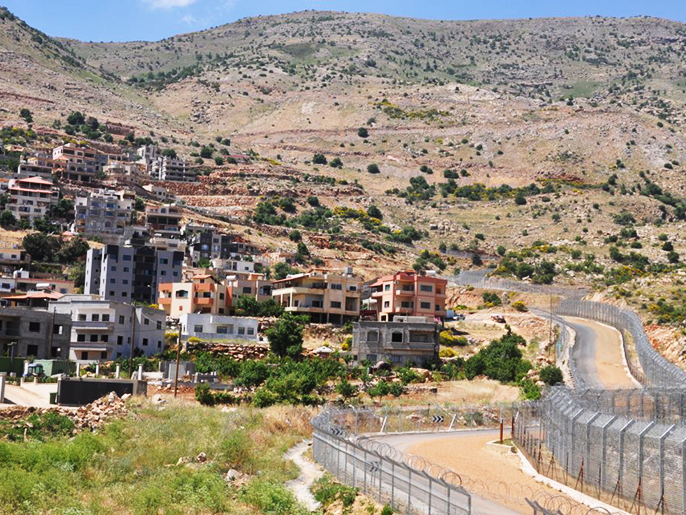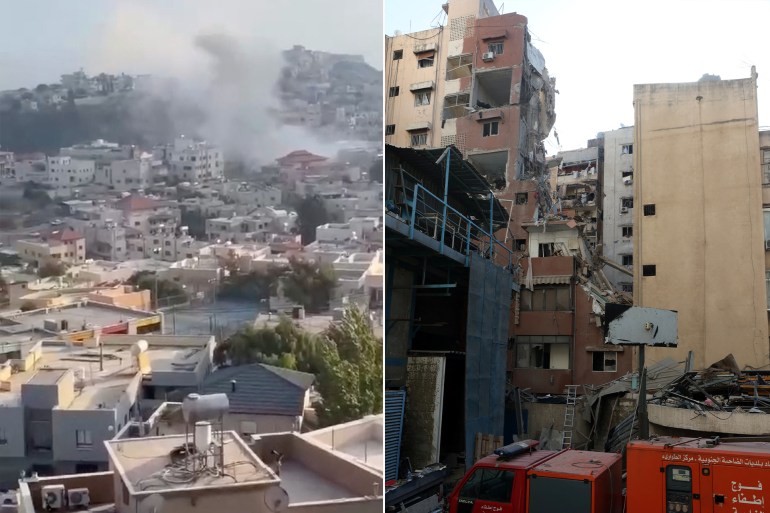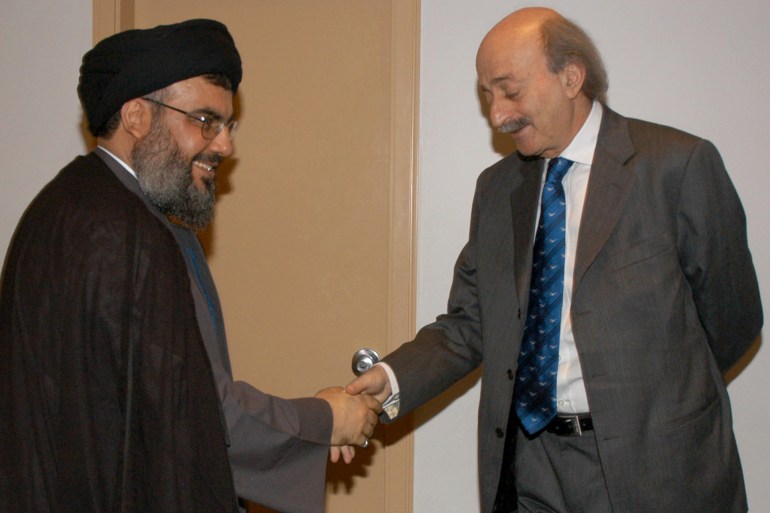He tried to ward off Israel's strife in Majdal Shams.. What is Jumblatt's story with Hezbollah? | Politics
BeirutThe Majdal Shams incident was a turning point in the border war between Hezbollah and Israel, and the question “Who fired the missile at the children in the occupied Syrian Golan?” became a detail after the dramatic turn taken by Israel and its drone attack on the southern suburbs of Beirut.
Israel's attack resulted in the assassination of Hezbollah military commander Fouad Shukr, describing its aggression as “a response to the Majdal Shams massacre” and “the assassination of the killer of its children.”
Overnight, the Golan Heights became the scene of an explosion of tension between Israel and Hezbollah, despite the latter's categorical denial of any involvement in the rocket fire.
Two days before the Israeli aggression on the suburb, the Druze leader and head of the Progressive Socialist Party, Walid Jumblatt, was moving on more than one front to contain the situation in the Syrian town with a Druze majority, in defense of its identity after Israel tried to claim that the victims were Israeli citizens.
Support the resistance
Jumblatt warned the Druze against “any slippage into the enemy's destructive project” and accused Israel of being behind the massacre, stressing that the party had nothing to do with it. He declared absolute support for the resistance in Lebanon and Palestine. He said, “No one is giving lessons to Majdal Shams.”
Before Israel's aggression on the southern suburbs, which it extended to Tehran by assassinating Haniyeh, Jumblatt announced that he had received a call from US envoy Amos Hochstein, carrying an Israeli threat to Lebanon.
In practice, Jumblatt’s position – which reflected his sensitivity to the danger of Israel exploiting the issue – had a profound impact on many levels:
In Majdal Shams, his position had an impact on the Druze arena in general, and on the town’s residents who refused to allow Israeli Prime Minister Benjamin Netanyahu to visit at the same time as the funerals of the victims of the missile strike. Jumblatt’s statements also weakened Israel’s position, which tried to strip the people of Majdal Shams of their identity.
On the part of Hezbollah, the Druze leader's position represented a positive development in its relationship with it, noting that his support for the resistance had been clear since the beginning of the war, and he received a special letter of thanks from its Secretary-General, Hassan Nasrallah.
On the domestic level, Jumblatt's position exacerbated the rift with his former allies from the “March 14” forces, who are opponents of Hezbollah and those opposed to its involvement in the war, most notably the Lebanese Forces Party and its allies. His position in support of the resistance had a negative impact on them, as was evident in the statements of a number of figures who considered that Jumblatt had abandoned “March 14” and become an ally of the resistance axis.

Shifting positions and allies
The personality of the leader of Mukhtara in the Chouf district – Walid Jumblatt (75 years old) – is characterized by political stardom, and his positions combine political acumen, sarcasm, historical reading, and anticipation of the future.
Historically, he was known for his changing positions, which were often linked to critical circumstances and contexts, and remained a subject of interest and tension between his allies and his changing opponents as well.
Since the assassination of his father, the political leader Kamal Jumblatt, in 1977, who founded the Progressive Socialist Party and was known for his support of the Palestinian cause, Jumblatt Jr.’s relationship with the Syrian regime (accused of assassinating his father) has been the focus of fluctuations between alliance and hostility, as well as with the Christian forces, as one of the remnants of the Lebanese civil war.
But the peak of the Lebanese division – in which Jumblatt played a pivotal role – came after the assassination of the late Prime Minister Rafik Hariri in 2005 and the Syrian withdrawal from Lebanon, when he founded the “March 14” movement alongside Hariri and Samir Geagea. A broad political alliance was formed as the country was divided between the “March 14” camps and the “March 8” forces led by Hezbollah and the Amal Movement.
The Lebanese, and the Syrians as well, will not forget Walid Jumblatt’s speech in a million-man demonstration by the March 14 forces, after the assassination of Hariri, when he chanted before the crowds in Martyrs’ Square, his famous phrase, “Oh Beirut, we want revenge… from Lahoud and from Bashar.”
He also composed satirical poetry about the Syrian president, addressing him by saying, “Oh monkey that nature does not know… Oh snake that all snakes fled from… Oh whale that the seas have thrown up… Oh half-men, oh Bashar…”
Jumblatt and Berri
Perhaps the most stable and deep political relationship that Walid Jumblatt has is the one that connects him with the leader of the Amal Movement and Speaker of Parliament Nabih Berri (an ally of Hezbollah). The two figures are linked by a friendship that endured even at the height of the hostility between Hezbollah and Jumblatt, as Berri was a bridge of communication between them.
Amal Movement MP, Mohammad Khawaja, told Al Jazeera Net, “The relationship between Speaker Berri and Walid Jumblatt is historic and distinctive, and has not been shaken even in the most difficult circumstances. It has contributed to strengthening general stability, and aims to consolidate the unity of the Lebanese, which Imam Musa al-Sadr described as the best aspect of the war against Israel.”
But the most prominent determinants of Jumblatt's positions currently – according to Khawaja – are Palestine and its just cause, as “circumstances have proven that Jumblatt does not miss the mark based on a firm nationalist position.”
Jumblatt realizes that the Israeli goal is to liquidate the Palestinian cause – as Khawaja says – and “quickly refused to accuse Hezbollah of bombing Majdal Shams, so he held Israel responsible.”
In Khawaja's opinion, Jumblatt succeeded in containing the situation “after Israel rushed to exploit the Majdal Shams issue by inciting people of the same issue against each other.” However, “the position of the town's people, who reject the occupation and adhere to the national and Arab identity, in addition to the positions of the leaders and wise men of the Druze community, blocked the path of Israel, which uses Majdal Shams as a pretext to justify its aggression against Lebanon.”
Khawaja describes Majdal Shams as “resistant to Israeliization” after its people refused to be granted Israeli identity since the beginning of the occupation, and “those who were martyred were Syrian Arab Druze.”

Jumblatt and the Lebanese Forces Party
This reading does not align with the opinion of the Lebanese Forces Party and its allies, who refuse to identify with Hezbollah and its choices. Lebanese Forces MP Ghiath Yazbek told Al Jazeera Net, “Our view of the developments of the war precedes the Majdal Shams incident and what followed it. We do not view it as a way of placing responsibility on one party rather than another, because we view Israel as a hostile entity that has attacked us.”
But Yazbek adds, “We believe that Hezbollah is dragging Lebanon into woes with Israel, because the slogan of unity of arenas did not provide protection for the Palestinians in Gaza or Lebanon.”
As for Jumblatt's position, it is not new in Yazbek's opinion, and “at moments when the Druze community is threatened, he positions himself where he believes he can provide it with safety.”
Yazbek stresses the rejection of the forces and their allies of Jumblatt’s positions. He says, “We doubt that Hezbollah will deal with him as an ally, and if things change and Jumblatt sees that protecting the Druze comes from a different position, he will receive the opposite message from Nasrallah.”
He concluded by saying, “We do not want to attack Hezbollah at the present time, but appeasing it in the manner of Jumblatt will be a free card that the Druze will not benefit from, because what benefits them is the legitimacy of the state.”
Jumblatt, Druze and Israel
For his part, writer and political analyst Hussein Ayoub, in his interview with Al Jazeera Net, deconstructs Jumblatt’s position on Hezbollah and Israel and its connection to the Druze reality from a different perspective. In his opinion, anyone who reviews the history of the Jumblatt leadership, at least from Kamal to Walid, will find that the position on the Israeli occupation is at the core of the party’s literature.
But the most prominent determinants of Jumblatt’s position, according to Ayoub, “are his concern for leadership, for the sectarian group (the Druze minority), and for Lebanon. Concern about the fragmented Syrian reality, and about the Arab reality if the normalization process with Israel continues,” explaining, “Jumblatt has become filled with anxiety that accompanies him wherever he moves and speaks.”
By the way, according to the same political analyst, Jumblatt sensed about a month ago that there was a plot against the Druze reality at the regional level, and the incidents in Sweida worried him, so he “took the initiative to open up to the head of the Lebanese Democratic Party, Talal Arslan, under the title of reuniting the Druze house, and he was less harsh than any previous time in talking about the Syrian regime, in light of what he had learned about Israeli attempts to exploit the Druze reality in Sweida.”
The writer says, “What happened in Majdal Shams showed that Jumblatt's fears are justified. He is currently moving between the limits of preventing sectarian strife, fortifying the Lebanese reality, protecting his group from any attempts to breach it with foreign agendas, and remaining within the ceiling of the Arab position supporting Palestine.”
According to Ayoub, this Jumblatt combination is not easy to market with either internal or external parties, “but the most dangerous thing is the difficulty of marketing it at the level of the Druze community, where Jumblatt and the leaders of the Socialist Party face embarrassing questions from the party’s audience and supporters, centered around the role of Hezbollah.”
Jumblatt and the balances
Ayoub believes that Walid Jumblatt measures his position based on national balances. Just as he did in the July 2006 war, “he puts aside his political reservations about Hezbollah and the axis, and considers standing with it a balancing element in the face of the state of political and sectarian polarization that has made the position of the two prominent Christian parties (the Free Patriotic Movement and the Lebanese Forces) merge with a rejection of Hezbollah’s involvement in the front supporting Hamas and the Palestinian resistance.”
Therefore, according to Ayoub, Jumblatt finds it his duty to stand with the party and postpone questions and accountability until after the battle, because the defeat of any internal component will lead to an imbalance.
Here, Jumblatt agrees with Ayoub's opinion with Berri, “who rejects the call for dialogue without the participation of the Lebanese Forces, so as not to repeat the experience of the Lebanese National Movement in 1975 and 1976 by calling for the isolation of the Kataeb Party.”
The importance of Jumblatt’s role after the Majdal Shams incident is embodied, according to Ayoub, in the American envoy Hochstein’s choice to contact him in his capacity as a Druze leader in the region, who has the ability to influence the Druze of Sweida and the Golan Heights, and was the spearhead in communicating with the Druze of 1948, to abort the project of compulsory recruitment in the Israeli army.

Jumblatt and Hezbollah
Many wonder about the mystery of the ebb and flow of the relationship between Jumblatt and Hezbollah. Here, Ayoub reminds us that blood is what usually creates dividing points between Lebanese sects. However, “no blood has been shed in the history of Druze-Shiite relations since the beginning of the civil war, except for the moment of May 7, 2008, and Jumblatt quickly turned that page.”
Hezbollah, in Ayoub’s opinion, understands Jumblatt’s volatile positions. After using the Hezbollah scarecrow for sectarian mobilization at an electoral moment to make the Druze feel that they are existentially threatened, the next day the mobilization is used to serve openness to Hezbollah and reassure it, as it is currently doing, to the point that the party has come to know Jumblatt by heart whether to be hostile or appeased.
If it weren't for Jumblatt's calculations in his Arab relations, specifically Saudi Arabia, he would have been, in Ayoub's opinion, “the first to request an appointment to meet Nasrallah after the Majdal Shams incident, to block the path to sectarian strife.”
